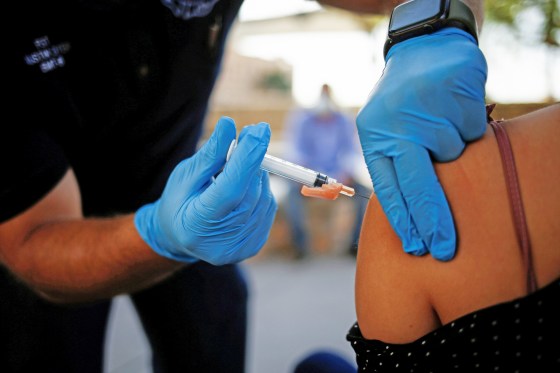The White House on Wednesday continued to press Congress to provide emergency funding it says it needs to buy additional Covid-19 vaccines, treatments and other critical pandemic tools.
Without the funds, the U.S. faces major cutbacks in its Covid response efforts, including a critical shortage of monoclonal antibody treatments and an insufficient supply of fourth vaccine doses that may be needed for the general public this fall, the White House coronavirus response coordinator, Jeff Zients, said at a briefing.
Full coverage of the Covid-19 pandemic
"The consequences of congressional inaction are severe, and they are immediate," Zients said.
The White House is asking Congress for at least $22.5 billion in pandemic aid.
The administration had been set to get $15.6 billion for the Covid pandemic response, but Democrats were forced to remove the funds as part of negotiations over the sprawling $1.5 trillion government spending package that passed early this month.
The lack of funding comes at a critical moment in the pandemic, Zients said.
Covid-19 cases, hospitalizations and deaths — driven in recent months by the omicron variant of the coronavirus — still remain low in the U.S., but there are early signs that case numbers could increase in parts of the country as a subvariant of omicron, known as BA.2, spreads throughout Europe and other parts of the world.
BA.2 accounts for nearly 35 percent of new cases in the country, according to estimates from the Centers for Disease Control and Prevention.
The CDC’s director, Dr. Rochelle Walensky, said at Wednesday's briefing that health officials are seeing small increases in cases in parts of the Northeast, although there isn't any indication yet that the increases are leading to an increase in severe illnesses or hospital stays.
Because of lack of funds, the administration Monday reduced the supply of monoclonal antibody treatments allocated to states by 35 percent, Health and Human Services Secretary Xavier Becerra said at the briefing.
It also scaled back plans to buy AstraZeneca's preventive treatment, known as Evusheld, for immunocompromised people, Becerra said.
In addition, the government is no longer bearing the cost of Covid testing and treatments for the uninsured, and it will no longer fund vaccinations in early April, he said.
Zients warned of potential impacts to vaccinations in the fall, if they are needed.
The U.S. has enough supply of vaccines to supply fourth doses to the immunocompromised and the elderly, but it lacks the supply needed for the general public, he said.
“The virus is not waiting for Congress to act,” Zients said. “With every minute this funding request is stalled, we’re losing the ability to protect people and be prepared.”
The funding crisis won’t affect doses for children under age 6 should the Food and Drug Administration authorize vaccines for that age group.
Zients said the administration has already secured the supply for that age group and is prepared to distribute the doses to tens of thousands of pediatricians’ offices and other vaccination sites across the country.
Follow NBC HEALTH on Twitter & Facebook.

